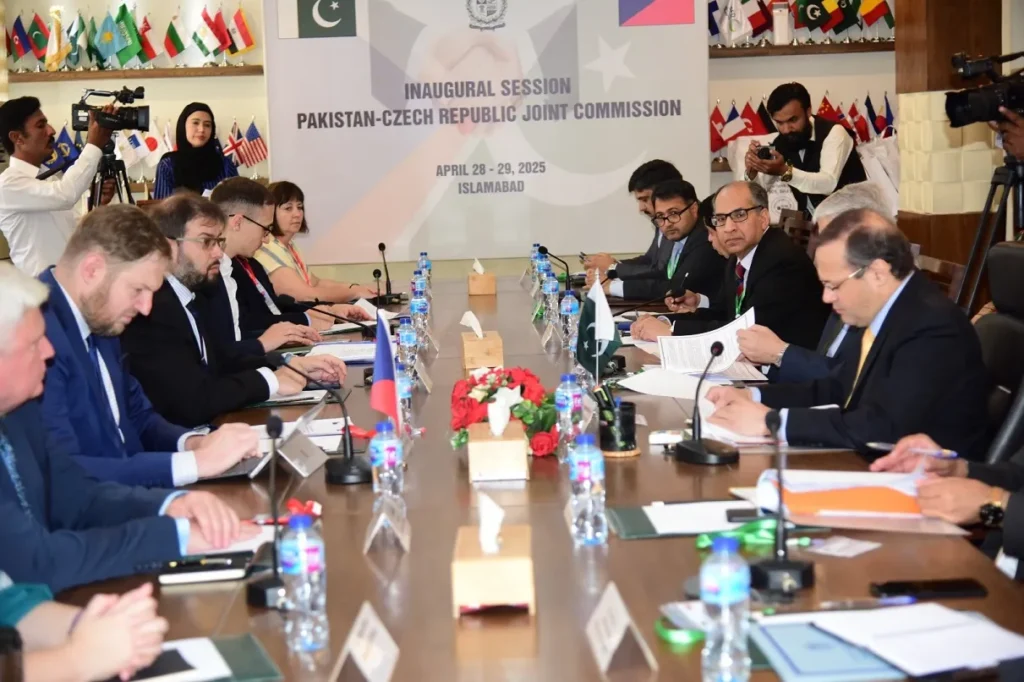Islamabad: Pakistan and Czech Republic Joint Commission worked out a great deal of length on host of sectors like industrial cooperation, energy investment, green energy projects, education, labor migration, ICT, health and cancer registry, surgical and sports goods. In Pak-Czech JC, the list is never ending and many more aspects are covered.
The inaugural session of the Pakistan-Czech Republic Joint Commission (JC) on Economic Cooperation took place in Islamabad, marking a key milestone in bilateral relations.
The session was held under the framework of the Agreement on Economic Cooperation, which was signed by both governments in Prague on July 26, 2023.
This first JC meeting resulted in the signing of important protocols, setting the stage for deeper economic collaboration between the two nations.
Co-chaired by H.E. Muhammad Humair Karim, Special Secretary at Pakistan’s Ministry of Economic Affairs, and H.E. David Müller, Director General for the EU and Foreign Trade Section at the Czech Republic’s Ministry of Industry and Trade.
The meeting saw the participation of high-level delegations, including officials and representatives from the private sectors of both countries.
In his address, Muhammad Humair Karim highlighted the complementary strengths of the Czech Republic’s industrial prowess and Pakistan’s strategic location and emerging market potential.
He emphasized the need to boost bilateral trade by simplifying trade procedures, reducing tariff and non-tariff barriers, and establishing direct logistics channels.
Industry & JWG
He also invited Czech businesses to invest in Pakistan’s Special Economic Zones (SEZs), particularly in key sectors such as automotive, renewable energy, agricultural technology, information technology, and manufacturing.
The delegations agreed to organize business forums and sector-specific exhibitions in both Prague and Islamabad.
They also proposed the formation of Joint Working Groups (JWGs) to focus on specific areas such as Trade and Investment, Health and Pharmaceuticals, and Information Technology.
This initiative is seen as a significant step in fostering greater cooperation between the two countries.
Investment cooperation was another key topic, with both sides renewing efforts to negotiate a Bilateral Investment Agreement.
The aim is to finalize a modern treaty that would facilitate and protect two-way investments.
Discussions also centered around joint ventures in sectors like surgical instruments, sports goods, leather, and footwear, with a focus on supporting SMEs and fostering innovation partnerships.
Energy & Education
Energy cooperation was a major focus of the discussions, with the Czech Republic sharing its transition goals under the European Green Deal and Pakistan highlighting potential opportunities through the Oil & Gas Development Company Limited (OGDCL).
The two sides explored collaboration in renewable energy, energy efficiency technologies, and technical training, with a particular interest in developing research and development partnerships to address regional energy challenges.
In the health sector, Pakistan proposed various initiatives including regulatory collaboration, data sharing, capacity building, joint research, and the creation of a digitalized cancer registry.
In education, the two countries discussed student and faculty exchanges, participation in Erasmus+ programs, and aligning Technical and Vocational Education and Training (TVET) programs with the labor market needs in both countries.
ITC & Labor Migration
Labor and manpower cooperation was another important area, with Pakistan suggesting the signing of an MoU on labor mobility.
The proposal included strategies for skills recognition, pre-departure training, and worker welfare.
The Czech delegation acknowledged the importance of safe and structured labor migration and agreed to refer the proposal to the relevant authorities.
Read More: Pakistan Collaborates with Czech Republic to Establish Electric Vehicle Manufacturing Plants
The two sides also discussed enhancing cooperation in the digital economy, particularly in areas such as cybersecurity, emerging technologies, and IT services offshoring.
The establishment of a Joint Working Group on IT and Telecommunication was favorably received.
In the transport and infrastructure sectors, the Commission welcomed the finalization of the Air Services Agreement (ASA) and discussed potential areas for cooperation in public transport modernization, urban mobility, aviation training, and transport technologies.
Environmental cooperation was another key topic, with discussions focusing on climate adaptation, wastewater treatment, hydrological modeling, and waste-to-energy solutions. Pakistan shared proposals for various environmental projects, while the Czech side offered technical assistance and expertise in these areas.
Both countries agreed to enhance cooperation in standardization and metrology, with plans to work on mutual recognition, certification frameworks, and support for the National Metrology Institute of Pakistan (NMIP) in collaboration with the Czech Metrology Institute (CMI).
The session concluded with an agreement to hold the second meeting of the Pakistan-Czech Republic Joint Commission in Prague in 2026, with the specific date to be finalized through diplomatic channels.
Also Read: Czech Healthcare Solutions
The launch of this Joint Commission represents a significant step toward deepening economic ties between Pakistan and the Czech Republic, with practical collaboration across a range of sectors.
